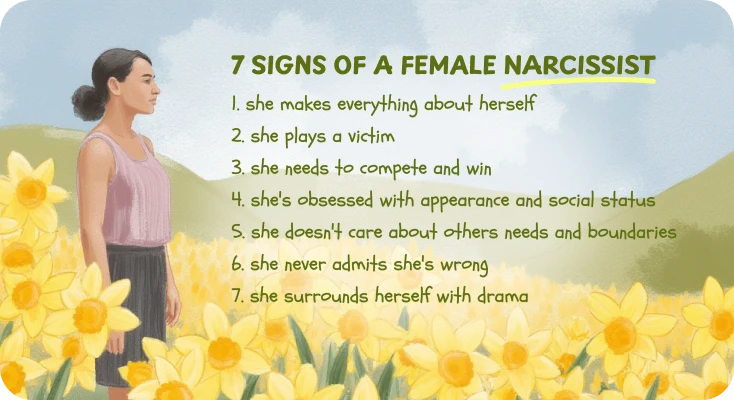Do you have a female friend who always speaks in a monologue? Or have you noticed how your girlfriend turns into an obsessive competitor when you play board games together? Or maybe you’ve never heard your mother apologize? These traits can be among the 7 signs of a female narcissist.
Traditionally, the literature and the research on narcissism are focused on men. But what do we know about female narcissists? Certainly, a formal diagnosis from a licensed professional is needed to know if one has narcissistic personality disorder (NPD).
However, If you’ve ever wondered if your boss’s behavior is a symptom of the female narcissist at work or if you’re suspicious you’re dating a narcissist, let’s check it. To look at your relationships more objectively, you should know these 7 signs of a female narcissist.
7 Signs of a Female Narcissist
Understanding the 7 signs of female narcissists can help handle tricky relationships and see unhealthy patterns of behavior. Here’s how these signs might show up:
1. She Makes Everything About Herself with Little Room for Another’s Input
In social interactions, it’s natural for people to share personal stories and experiences as a way to connect. However, with a female narcissist, it’s rather a monologue than a conversation.
Narcissistic women may see the world in a way that makes it seem like everything happens to them or because of them. Plus, they often lack empathy—the ability to put ourselves in another’s shoes and have compassion for their experiences. Thus, a combination of these factors makes them dominate conversations.
Here are some common ways this behavior is expressed:
- Constant interrupting others: Women with narcissistic tendencies may frequently cut off others to share their thoughts or stories, such as saying, “That reminds me of what happened to me last week…”.
- Redirecting conversations: For example, if a friend shares news about a promotion, women with narcissistic tendencies might respond with, “That’s great! But I’ve got to tell you about my latest project that everyone loved!” Instead of celebrating her friend’s achievement, she abruptly returns the spotlight to herself.
- Exaggerating personal stories: If someone mentions a minor setback, she might recount a similar experience but exaggerate it to make it seem more dramatic. She’d be like, “Oh, that reminds me of when I was completely overwhelmed by my responsibilities! I was practically drowning!” This draws attention back to her and her perceived suffering. There is a preoccupation with fantasies of unlimited success and a firm belief they are special.
- Using other people’s achievements as a comparison: For instance, when a friend talks about their recent accomplishments, narcissistic women may respond with, “That’s nice. Have you heard about my success in this area? I totally outshined everyone.” Instead of congratulating her friend, she just has to one-up them. There is an overpowering sense of self-importance.
- Seeking validation: A narcissistic girlfriend may often ask for compliments, saying things like, “Do you think I handled that situation well?” or “Wasn’t I amazing in that meeting?” This shows her need for constant and excessive affirmation, pulling the focus back to her.
- Devaluation of others’ feelings: If a friend expresses sadness about a breakup, narcissistic women might respond, “I get it, but I’ve had way worse relationships. You don’t know what heartbreak is until you’ve been through what I have.” This minimizes the friend’s feelings and brings attention back to her own experiences.
2. She Plays a Victim
Playing a victim can be one of the signs of narcissistic traits. Presenting themselves as helpless may allow them to attract attention and support to gain sympathy and manipulate others. Here are some possible scenarios when narcissistic women might play a victim:

Get praise
People may perceive narcissist traits in females as a Martyr Complex marked by self-sacrifice and service to others at your own expense. However, narcissistic martyrs calculate their actions and do this to seek attention and praise. Or take advantage of others to achieve their own wants.
For example, the female narcissist at work may often volunteer for difficult tasks or take on extra responsibilities, only to later complain about how much she sacrifices for others. Or find it socially permissive to engage in arrogant attitudes.
For instance, she might say, “I always put everyone else first, and no one appreciates it.” This can make others feel guilty and encourage them to acknowledge her efforts, reinforcing her victim role.
Win the conflict
One of the remarkable narcissist traits in women is keeping a list of everything she’s done for people whenever they argue. She uses this to make them feel guilty. Even a small criticism or innocent comment can set her off and lead to a long-lasting grudge.
If someone confronts her about her behavior, she might respond with tears, saying, “I can’t believe you’d think that of me! I’m always here for everyone, and this is how I’m treated?” This emotional outburst can distract from the criticism and make others focus on her feelings instead.
Typically, narcissistic people may believe that any emotional hurt they can cause is justified. They may feel their sacrifices are great, but others simply miss how unique and worthy of entitlement they are to an excessive degree.
Use sympathy to control
One of the signs of a narcissistic female friend is using toxic sympathy and self-degrading statements as a tool to control those around them. For instance, when friends make plans, she might react by acting upset or distant, saying something like, “I guess I’m just too much of a burden to have around.”
This kind of statement pressures her friends to either include her or change their plans to make her feel better.

3. She Needs to Compete and Win
Among the 7 signs of a female with narcissistic qualities is also an irresistible desire for competition (which is typical for the Queen female archetype as well, but stems from the feeling “I’m not enough” rather than from a natural desire to be a leader). A narcissistic woman competes with everyone around her, whether it’s coworkers, family members, friends, their wives, or women in general.
Typically, a narcissistic woman’s desire to compete is driven by her poor sense of self-worth and jealousy. Other people’s success makes them feel hurt and damages their self-esteem. So, they may strive to win at any cost to feed their ego. They often feel intense envy for others’ successes or believe others envy them.
For example, during a game night with friends, a narcissistic girlfriend might become obsessed with winning. When she loses, she can become angry and irritable and even cheat subtly to win. Thus, she turns simple games into high-stakes competitions.
Moreover, in their family, narcissistic women can compete with their own children, especially their daughters. This is most common when the daughter becomes an adult, as her narcissistic mother may feel subconscious jealousy. It can express in devaluing the daughter’s achievements. Or stealing attention by demanding excessive admiration.
For example, if the daughter gets a promotion or recognition at work, the mother might respond with, “That’s nice, but I had to fight harder for my promotions,” shifting the focus back to her own achievements. In consequence, children of narcissistic parents often have low self-esteem and self-worth.
4. She’s Obsessed with Appearance and Social Status
Narcissistic women typically focus on their looks or outward qualities because it makes them feel valued and admired. They may think that being attractive and well-liked boosts their self-esteem and social status.
For example, they might spend a lot of time and money on expensive clothes, luxury accessories, beauty treatments, or workouts.
They often post carefully edited photos on social media to show off a perfect lifestyle, looking for likes and comments to feel good about themselves.
If you’re wondering, “Is my girlfriend a narcissist?” pay attention to what kind of people she tries to be friends with. Social status is very important to narcissistic women.
They might hang out with influential people or throw fancy parties to impress others. They also may brag about their jobs, friends, or things they own as a way to show off their success. Preoccupation with fantasies of success is one of the most remarkable traits of the 12 narcissist traits list.
5. She Doesn’t Care About Others Needs and Boundaries
Another important sign among the 7 signs of a female narcissist is ignoring others’ needs and boundaries. Narcissistic women may act like they have power over everyone around them.
As an illustration, a narcissistic wife may incessantly call their partner at work to complain about small wrongdoing, disrupting the partner’s work demands for their petty inconvenience.
In the same way, a narcissistic mother might also go through a daughter’s messages or personal stuff without asking. That’s why lack of boundaries is often one of the symptoms of daughters of narcissistic fathers and mothers.
6. She Never Admits She’s Wrong
Another trait among the 7 signs of a female narcissist is that they rarely apologize and will defend themselves no matter what, even if their reasons don’t make sense. It’s one of the common female narcissistic traits – they truly may feel like they’d rather “die than apologize”.
This dramatic response is a defense mechanism to protect their low self-esteem and avoid deep inner shame. To them, admitting a mistake may feel like a personal failure. That’s why even a small disagreement makes them angry and manipulative.
In addition, a narcissistic girlfriend tends to blame others for her feelings. This behavior is meant to distract people from her own flaws and maintain her image of perfection.
For instance, if she feels criticized, she might say something like, “You always pick on me!” instead of considering the feedback.
Have you ever met people who never admit they are wrong?
7. She Surrounds Herself with Drama
One of the 7 signs of a female narcissist is dramatizing and escalating conflicts. And since they believe that the whole world is about them, they don’t even need to look for a reason.
For example, narcissistic personality disorder in women can be expressed in the belief that every observation or compliment to someone else is aimed at them.
Another example can be if a coworker says, “I love how well Sarah did in her presentation,” the narcissist might think, “Why didn’t they say something nice about me instead?”
They might also react by saying, “Well, I could have done it better if I had the chance.” Even in such an innocent dialogue, the female narcissist at work can see a reason to hold a grudge and start a one-sided war to keep all the attention on them.
Typically, narcissistic women may behave in the same way in the family. For example, she may have a bad relationship with her husband’s family or friends. She may create tension, gossip, plot, and provoke scandals to stay in the spotlight and control others.
Eventually, a narcissistic wife’s selfishness and need for attention can throw off the balance in the family. Everyone around her ends up walking on eggshells just to keep the peace. Later, children of narcissistic women may ask, “Why do I attract narcissists?”
Katherine Scott, M.Ed/Ed.S, LMFT, added the explanation on how to narcissists balance the desire to create drama around them with the desire to be liked by everyone. “In short, those with narcissistic tendencies have a weakness in this balance. If anything, they develop an ability to distract others from their shortcomings to connect with the drama they are familiar with and can be successful in mitigating for others. Those with a pervasive need to fulfill the image of importance stir the pot in ways that portray them as needed heroes at any cost. At some point, people become wise to this pattern, which is why those with Narcissism tend to have difficulty maintaining long-term relationships”.
Narcissist Traits in Female vs. Male
Both male and female narcissists have similar traits, and there are no specific distinguishing traits within the methods of diagnosing this personality disorder. Although many believe that men are more narcissistic than women, research hasn’t proven how big or lasting this difference is.
Let’s look at the types of narcissistic personality disorder in women and men to understand how these traits can show up:
- Overt or Grandiose Narcissism: More common in males, it can be adaptive (characterized by authority and self-sufficiency) or a maladaptive overt narcissist (characterized by exploitativeness, entitlement, and exhibitionism).
- Covert or Vulnerable Narcissism: Women more often show signs of vulnerable or covert narcissism. A covert narcissist may not seem arrogant. Instead, they often appear shy, quiet, and overly sensitive. When low self-esteem and insecurity mix with other narcissistic traits, it usually indicates covert narcissism.
- Communal Narcissism: People with this type of narcissism want to be seen as caring and helpful. They base their self-worth on how much they contribute to others and often exaggerate their good deeds. They also seek praise for their “kind actions” and feel superior to others because of their moral beliefs.
- Antagonistic Narcissism: This type is characterized by a lack of empathy and confrontational behavior. Antagonistic narcissists might be manipulative, deceitful, or abusive, often using others to get what they want.
- Malignant Narcissism: People with this form mix narcissism with antisocial behavior. They can show high levels of aggression and paranoia and don’t feel guilty about hurting others.
Breeze also asked Katherine Scott, a Licensed Marriage and Family Therapist, if narcissistic traits might manifest differently in men and women. “Due to the different gender stereotyping, cultural influences of gender norms, and general brain-wiring, narcissism can present differently for men and women. Women can utilize more catty and artful approaches to getting their grandiose sense of self-importance met, whereas men tend to be more cut-and-dry with their approach or lean heavily into gaslighting narratives. Domestic violence also tends to correlate with this personality disorder, as conflict navigation and accountability are weaknesses”.
Disclaimer
This article is for general informative and self-discovery purposes only. It should not replace expert guidance from professionals.
Any action you take in response to the information in this article, whether directly or indirectly, is solely your responsibility and is done at your own risk. Breeze content team and its mental health experts disclaim any liability, loss, or risk, personal, professional, or otherwise, which may result from the use and/or application of any content.
Always consult your doctor or other certified health practitioner with any medical questions or concerns
Breeze articles exclusively cite trusted sources, such as academic research institutions and medical associations, including research and studies from PubMed, ResearchGate, or similar databases. Examine our subject-matter editors and editorial process to see how we verify facts and maintain the accuracy, reliability, and trustworthiness of our material.
Was this article helpful?





